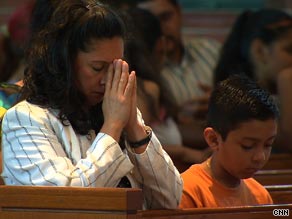That seems to be the conclusion of some observers here in the United States:
The Vatican’s invitation to disaffected Anglicans to join the Roman Catholic Church won’t have much effect in the United States, clergy members and theologians predict.
American Anglicans still have substantial theological differences with the Catholic Church, Anglican leaders point out.
Plus, conservative Episcopalians deeply troubled by the ordination of women or a broader inclusion of gays already have left the denomination, said the Rev. William Doubleday, dean of Bexley Hall Episcopal Seminary in Bexley.
The Episcopal Church is the 2.3-million-member U.S. branch of the worldwide Anglican Communion, which is made up of 77 million people. But the Episcopal Church’s unity with the communion has been threatened by its increasing acceptance of gay clergy and same-sex unions. Some conservative churches within the communion also disagree with the Episcopal Church’s ordination of women.
Since the Episcopal Church ordained an openly gay bishop in 2003, four dioceses and many individual congregations have left the denomination. Many of them have continued to call themselves Anglican and have aligned with conservative bishops in Africa or South America.
On Tuesday, the Vatican announced it will create a structure so that Anglicans can join the Catholic Church while preserving their liturgy and keeping their clergy members, even those who are married.
Individual Anglicans always have been welcome to join the Catholic Church, and some married clergy members from other denominations have been ordained Catholic priests, said Leo Madden, a theology professor at Ohio Dominican University. Anglican clergy members who are married could not become Catholic bishops.
What’s different this time is that the Vatican will set up a system through which groups of Anglicans, even an entire congregation, can join the Catholic Church.
“Rome is establishing a structure for large groups, rather than just one by one,” Madden said.
American Anglicans who have left the Episcopal Church already have places to turn, said Bishop Martyn Minns of the Convocation of Anglicans in North America, a group under the umbrella of the newly formed Anglican Church in North America.
The offer might be most attractive in the United Kingdom, where there are many disaffected Anglicans who lack such an alternative, Minns said.
Episcopalians who leave the church because they’re worried it has become too liberal are unlikely to take Pope Benedict XVI’s offer, said Bishop Thomas E. Breidenthal of the Episcopal Diocese of Southern Ohio, which includes Columbus.
“They would be more interested in maintaining a relationship with the Anglican Communion as they understand it,” he said. “Becoming a Roman Catholic would not solve the problem for them.”
Nor would it solve the theological disagreements that persist between the churches, said the Rev. Ron Baird, rector of St. Andrew’s Anglican Church in Lewis Center. He is a former Episcopal priest who once led St. Matthew’s Episcopal Church in Westerville before leaving in 2007 with most of the congregation.
A major problem for many Anglicans would be agreeing to the authority of the pope, Baird and Minns said.
There’s more at the link.

